#British Constitution
Explore tagged Tumblr posts
Text
In the Council he took his argument against the force to a high constitutional plane:
It did seem strange to him that it never occurred to those who took an active part in the discussion that the native police force as at present constituted, was clearly illegal, and in direct violation of the fundamental principles of the British constitution. The hon. Gentleman then went on to show that, according to the Bill of Rights, the raising of a standing army in time of peace other than the regular army, was illegal. This, in fact, was the foundation of all their rights, as secured to them by the great constitutional measure to which he alluded . . . The existence of such a force had in time past proved extremely dangerous to the liberty of the subject, and he saw no reason to doubt that, if tolerated, it would prove so again.
"Killing for Country: A Family History" - David Marr
#book quotes#killing for country#david marr#nonfiction#maurice charles o'connell#council#argument#constitutional#native police#police force#british constitution#bill of rights#army#illegal#violation
0 notes
Text

"POLITICIAN NEEDS TO BE SUPERMAN," Montreal Gazette. June 7, 1933. Page 5. ---- Social Ostracism for Spoliators of State Prescribed by Rev. L. Clare ---- DEMOCRACY UNDER FIRE ---- Alien Propaganda Not Dangerous in Presence of Humane Social Laws, Pastor Suggests ---- The true politician needs to be a superman. We should train them and expect honor from them, visiting upon those who make the states spoil the most contemptuous social ostracism, Rev. Lawrence Clare stated yesterday in his address, "Some Principles of Political Thinking" at the weekly luncheon meeting of the Rotary Club of Montreal at the Windsor Hotel. He emphasized the importance of respecting their art, "which is the greatest known to man."
Politicians are not popular, in fact, they are the scapegoats in connection with our present discontent and often are blamed where they have no responsibilty, Mr.Clare asserted. The political "high game of chess. In his opinion, is a difficult one, necessitating a keen knowledge of human nature. "To the knowledge of Machiavelli must be added that of Lincoln, because human nature is the material with which the politician works."
The wise politician, M. Clare believed. will have regard for men's souls. their possibilities and the reverence that is their due. "How may one maximize their freedom, for development In truth, beauty, adventure and peace?" he asked, for there lies national well being, and harbors, banks and concessions are but instrumental.' Democracy, he said, is under fire, and is believed to bring undesirable men to power, to encourage corruption, incapable of rapid decision and to be drugged by propaganda.
The politician must know how to settle the inefficiencies of democracy aside when big things are to be done, yet the people must be spirited enough to secure that this never is done save in their interests, Mr. Clare maintained. Denunciation of armaments, alliances and balance of power he thought futile, for "these are necessary resultants so long as human nature is what it is and the European and Asiatic situation is as inorganic as it is." Only those who can think in world terms, in his opinion, are fit to organize."
"Amid swift and alarming political changes, the politician needs to keep his head. Confronted by such things as the Russian experiment, it is difficult to avoid hysteria. What we need is facts, a spirit of analysis and valuation, plus quiet courtesy, whether the matter concerns Russia, Hitler or Mussolini. Allen propagandism is a seed that withers unless it falls upon the soil of social discontent.
"Humane social legislation has kept Britain quiet, imbuing her people with a feeling that private interests, on account of old age pensions, insurance, are identical with those of the state," Mr. Clare continued. As regards freedom of speech and restraint, he believed that all progress is initiated by challenging current conceptions. The only solution In this regard is a sliding scale of toleration, "for the more healthy a country, the more it can stand."
Idealists are a somewhat easy!prey for extreme Utopian builders of castles in the air, Mr. Clare found. The danger, in his opinion, is that of dreaming of some organization, for example, the state that is suitable to angels, but not to human nature, or to men of other traditions and conditioning, but not to men like ourselves. "They in the name of that dream attack with the intention of destroying existing organizations that are adapted, though perhaps imperfectly, to hman nature as it really is," he concluded.
A W. McMaster, president, was in the chair. The speaker was thanked by Rev. Dr. Leslie Pidgeon. Jim Laird outlined the comprehensive programme that has been prepared for the convention of Rotary International at Boston from June 26-30. urging members to bring the Montreal quota of visitors on this occasion to 100. Harry Maud sang several solos.
#montreal#canadian elite#canadian democracy#elite thinking#middle class ideology#british constitution#statemen#rotary club#canadian politics#great depression in canada#anti-communism#anti-ideology
0 notes
Text






"USS CONSTITUTION, under the command of Captain Isaac Hull, sailed from Boston on August 2, 1812 to off the coast of Halifax, Nova Scotia. On the afternoon of August 19, 1812 Hull and his crew sighted the British frigate HMS GUERRIERE, under the command of Captain James Richard Dacres.
As GUERRIERE closed to within a mile of the CONSTITUTION, the British hoisted their colors the two ships engaged in a fire fight. The CONSTITUTION’s thick hull, composed of white oak planking and live oak frames, proved resilient to enemy cannonballs. During the engagement, an American sailor was heard exclaiming, 'Huzza! Her sides are made of iron! See where the shot fell out!'. After intense combat, the severely damaged Guerriere was forced to surrender.
The next morning, Hull made the difficult decision to scuttle GUERRIERE. CONSTITUTION sailed for Boston and arrived on August 30. News of Constitution‘s victory quickly spread through town and throngs of cheering Bostonians greeted Hull and his crew. A militia company escorted Hull to a reception at the Exchange Coffee House and more dinners, presentations and awards followed in the ensuing weeks, months, and years. USS CONSTITUTION, for her impressive strength in battle, earned the nickname 'Old Ironsides.'"
Date: August 19, 1812
U.S. Naval History and Heritage Command: NH 64419-KN, 66-335-L, 66-335-M, 54-017-A, 66-193-A, 07-763-A, 60-362-C
#USS CONSTITUTION#Old Ironsides#United States Class#44-gun Frigate#Original 6 frigates#HMS GUERRIERE#HMS GUERRIERE (1806)#Fifth-Rate Frigate#Frigate#Warship#Ship#Sailing Ship#United States Navy#U.S. Navy#US Navy#USN#Navy#British Royal Navy#Royal Navy#War of 1812#August#1812#Artwork#Painting#my post
42 notes
·
View notes
Note
honestly they were disrespectful to themselves. they let it get completely out of hand for a MONTH. the palace did this to themselves
yeah... look nobody will get me to agree with people being like 'conspiracy theorists have gone too far' 'you've all been disrespectful towards catherine' 'there was never a reason for any of this' 'you should be ashamed for what you said' etc etc etc. because like... first of all, again, i hold zero respect for these people. why the fuck should i. but even if i did... it's their own fucking fault???? the fuck?????? lmao?????????? literally only a handful of people gave a fuck until that doctored photo. and then they just kept making it worse. and i'm sorry but i actually don't think they're entitled to their privacy when their entire job is pr and they're blatantly lying in all their pr shit like ? what else are you good for lol. but then that also makes me angry because as much as i don't like kate for several reasons i'm still a bit genuinely offended at her behalf for how they've handled all this shit.. like making her take the blame for the photoshop (i hope for her sake it was her own idea, because otherwise........), having her appear alone in the video announcing her cancer (why tf isn't william there when she's talking about how he's by her side lmao), the general just lack of giving a fuck about anything whilst the world went wild theorising about her.... i can't tell whether she's taking the fall to cover for something else or if they're just all absolute assholes ?? again like. i don't like kate middleton. for many reasons. but i like william and charles a whole lot less and it's infuriating that they're making me feel like she's been wronged lmao
#im not even SUPER anti royalty#i mean i think its fucking stupid and serves no purpose#but a lot of countries have royals who really are Just figureheads#and if that was all the british royal family was then whatever#i mean theyre still a horrible symbol of colonialism and general racism#but like it doesn't really matter that they're there#EXCEPT it kinda does because they still have way too much social power#like idgaf about the norwegian royal family but at least they're like. normal. hell they even fly commercial#which im sure is a pr thing but i do appreciate it#like nobody cares about them in norway but i don't think anyone dislikes them either?#because they just do Nothing#theres a speech at christmas/new years and a wave at constitution day and thats literally it#they show up to events but its so casual#i feel like the british royal family could do this so easily but they insist on doing things like a coronation that costs millions of pound#like?????????#oh my god#again. dont give a fuck about royals in any country. but come on.#if youre gonna exist at least just be like. a figurehead. and stop being fucking weird.#answered
45 notes
·
View notes
Text
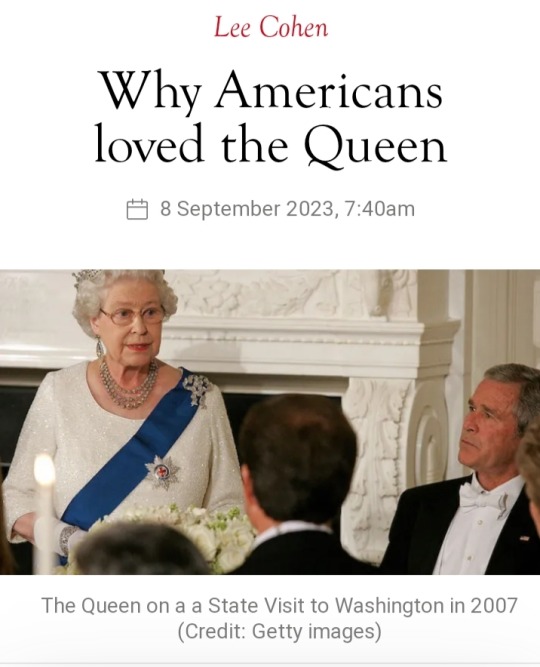
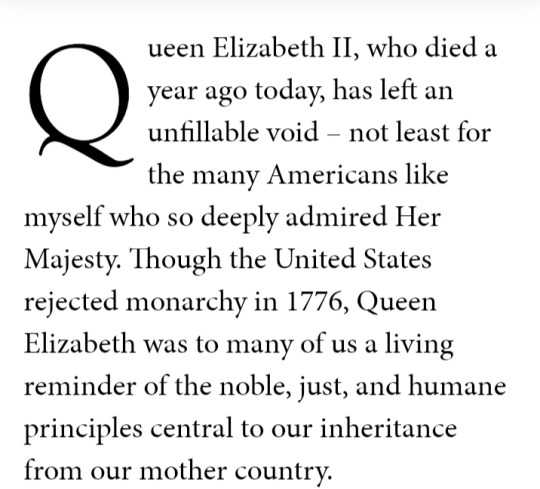
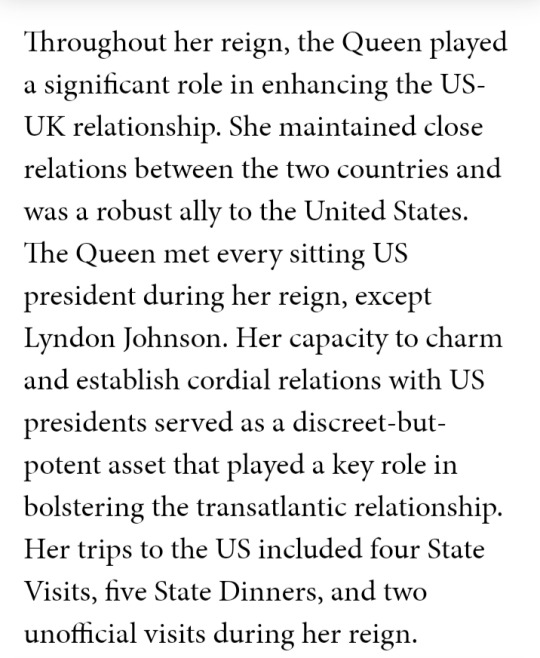
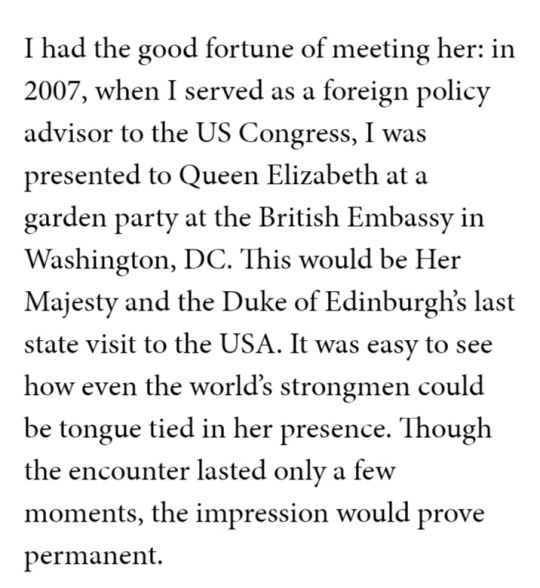
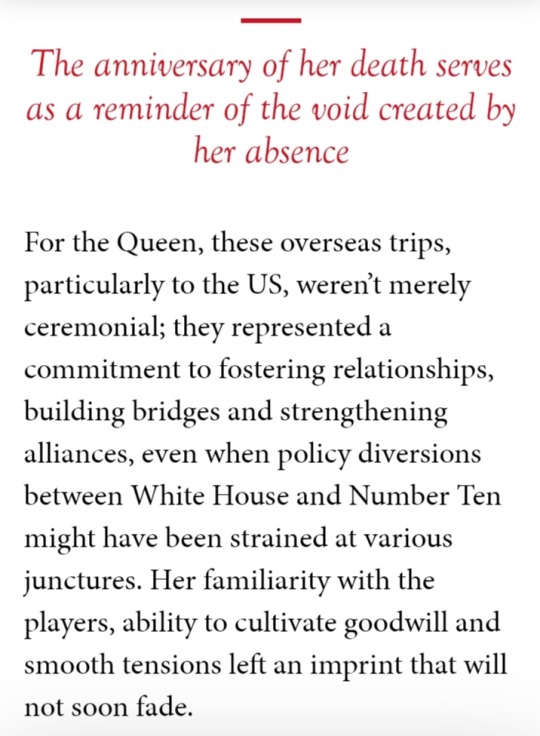
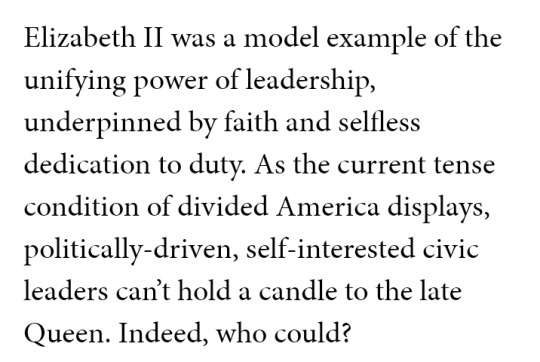
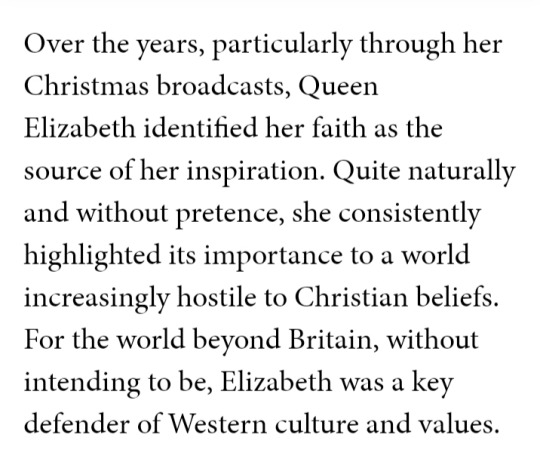
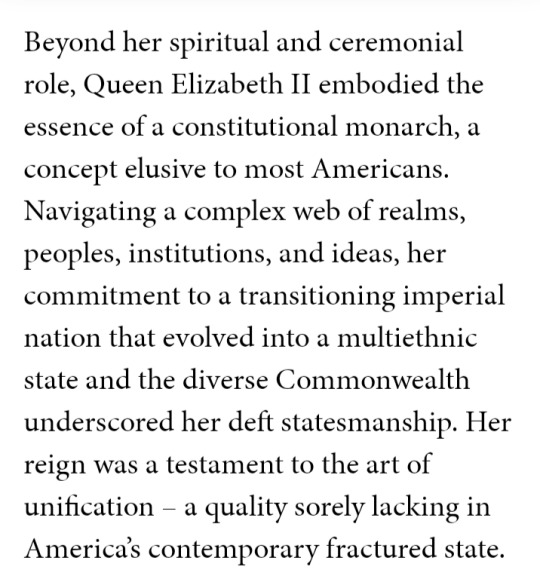
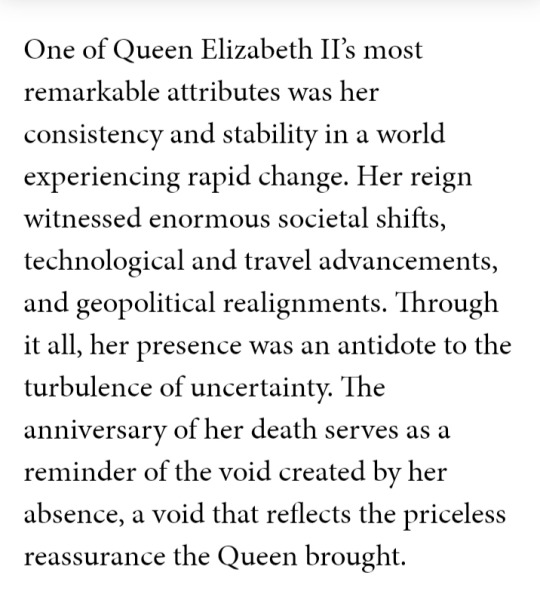
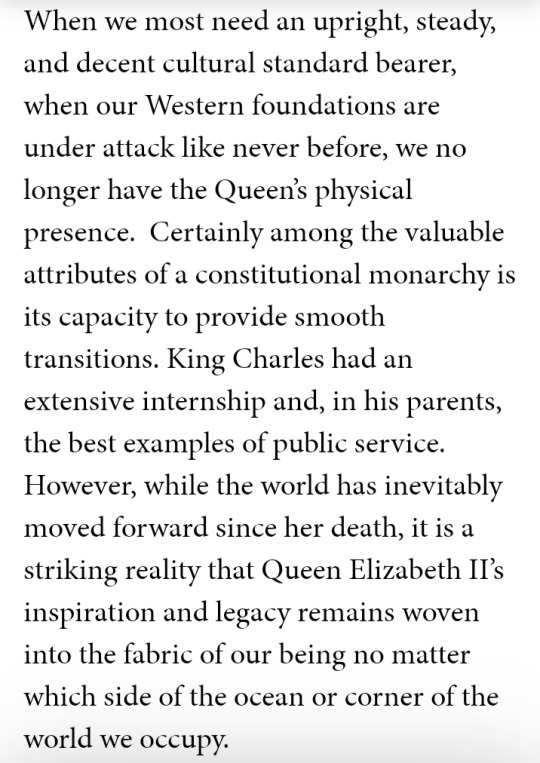
#Queen Elizabeth II#Her Majesty The Queen#British Royal Family#US-UK relations#United States#United Kingdom#inspiration#legacy#public service#constitutional monarchy
26 notes
·
View notes
Note
is your friend better from whatever poisoned him?
lol yes I think he finally got it all out. he lives to see another day
#we've been eating the same stuff so idk what did it to him bc im fine#think he did it for attention :/ /j#his weak british constitution couldn't handle the madrid sun
31 notes
·
View notes
Note
Is it just me or do you also wish the Canadian Royal Family had Canadian styles. Like yes I know with “personal union” it’s one and the same so why change it, but like, I mean. What are the Prince and Princess of Wales to Canadians? Wales is in Canada, but it’s our Monarchy just as much. I daydream of the Canadian Govt passing a law that gives them titles as such, eg. Prince of Niagara, or the Duchess of St. Laurence, or idek. In one way not doing so keeps the Britishness of the Monarchy as its core… idk. As a fellow Canadian monarchist what do you think :)
A timely theme for these cynical times. Since earliest settlement Canada has always been a monarchy, including Quebec - so I appreciate your interest very much.
Our constitution is the most monarchical in the world. For Canada to forsake the Crown, it would require a referendum plus the unanimous consent of all ten provinces. The chances of that are nil - and if it isn't broken, why try to fix it?
As for titles, I believe Canadians should receive whatever honours the sovereign wishes to bestow on them. It should be a royal prerogative.
#Canada#The Crown#Parliamentary democracy#Westminster#monarchy#constitution#British North America Act#1867#UK
10 notes
·
View notes
Photo

You can make all sorts of solid arguments against a constitutional monarchy - but the point of monarchy is precisely that it is not the fruit of an argument. It is emphatically not an Enlightenment institution. It’s a primordial institution smuggled into a democratic system. It has nothing to do with merit and logic and everything to do with authority and mystery - two deeply human needs our modern world has trouble satisfying without danger.
- Andrew Sullivan
This is the genius of the British monarchy, supremacy exemplified in the late Queen Elizabeth II and now in King Charles III. Walter Bagehot was the first to really get to the heart of the matter.
Walter Bagehot, a journalist who would co-found and edit The Economist magazine was one of the greatest Victorians of the 19th century and he concerned himself with the workings and the reform of the delicate constitutional arrangements between parliament, the House of Lords, and the monarchy as so much is based on custom and unwritten practice.
Walter Bagehot published his classic work, The English Constitution in 1867 but it is the best way to understand the delicate balance of parliament and the monarchy. No one has written a finer work than Bagehot and his book remains the bible for many interested in constitutional matters regarding the monarchy.
In it he argued that the constitution was divided into two branches. The monarchy represents the “dignified” branch. Its job is to symbolise the nation through pomp and ceremony. The government - Parliament, the cabinet and the civil service - represents the “efficient” branch. Its job is to run the country by passing laws and providing public services. He was right to say that the dignified branch governs through poetry, and the efficient branch through prose.
In Bagehot’s view, a politically-inactive monarchy served the best interests of the United Kingdom; by abstaining from direct rule, the monarch levitated above the political fray of tribal politics (of left and right), and remained a respected personage to whom all subjects could look to as a guiding light. The monarch was to stay severely neutral and be apolitical. Instead the monarch was to embody in the flesh the core values of a nation.
There is a tremendous burden tied to that kind of role. When Elizabeth Windsor became queen, she was tasked as a twenty-something with a job that required her to say or do nothing that could be misconstrued, controversial, or even interestingly human - for the rest of her life. She achieved that both stoically and heroically in many people’s eyes. King Charles III has taken on that inhuman mantle now. Time will tell if he can follow the late Queen’s example.
Duty, sacrificial service, and honour....without power. That’s the role of modern royalty.
It’s hard for non-British people to understand how a monarch can come to embody the psyche of the nation. The Crown represents something from the ancient past, a logically indefensible but emotionally salient symbol of something called a nation, something that gives its members meaning and happiness. As Bagehot says, it’s an act of imagination.
Some of my non-British friends particularly can’t quite grasp this connection; to them the British royal family functions mainly at best as a different form of celebrity. But to these friends as well as those republican friends sincerely opposed to monarchy can and should grasp something else - nations and cultures need people and institutions who transcend politics, which left to itself quickly descends into tribalism or worse, authoritarianism.
#sullivan#andrew sullivan#quote#monarchy#british monarchy#king charles III#united kingdom#crown#royalty#constitutional monarchy#history#custom#heritage#tradition#queen elizabeth II#bagehot#walter bagehot#society#politics
108 notes
·
View notes
Text
#OTD in 1949 – The Republic of Ireland withdraws from the British Commonwealth. The British Parliament recognises the declaration but asserts sovereignty over the six northern counties.
The withdrawal of the twenty-six counties from the British Commonwealth is recognised officially by Britain, thereby, becoming the independent Republic of Ireland. The Ireland Act 1949 passed by the House of Commons recognised the withdrawal. Éamon de Valera had introduced his Constitution (Bunreacht na hÉireann) in 1937, the Irish Free State, or Éire as it was renamed, was well-nigh an…
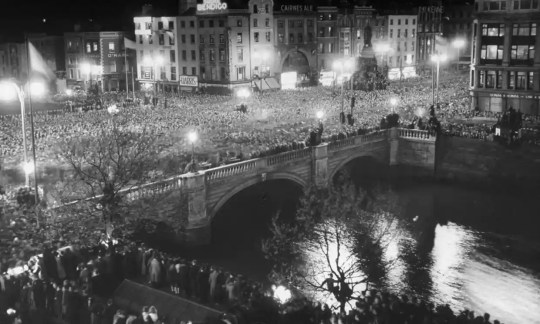
View On WordPress
#Éamon De Valera#Éire#British Commonwealth#Bunreacht na hÉireann#Constitution of Ireland#Dublin#House of Commons#Ireland Act 1949#Nationalists#Northern Ireland#O&039;Connell Bridge#O&039;Connell Street#Republic of Ireland#Tim Pat Coogan#Ulster#Withdrawal
12 notes
·
View notes
Text
I understand that the names of ships are not traditionally changed, even when captured by enemy forces, but there is something so freaky to me about His Majesty's Ship Bonne Citoyenne.

HMS Bonne Citoyenne (1796)
#royal navy#french revolutionary wars#hms bonne citoyenne#age of sail#aarrrgh!!!!#what if the british had captured uss united states or uss constitution i'm dyin
64 notes
·
View notes
Text
I don’t think you understand the internal war between the “history special interest” part of me and the “theater kid” part of me when Hamilton comes on- it’s INTENSE
#like dang that beat#also broadway#also that lighting wow#and the set-#but also like#you have no idea how hard it is to not remind ppl that Hamilton spoke for five hours at the constitutional convention- not six#I mean also the extreme elitism and the way that the cause of revolution was portrayed#also the portrayal of king George iii#also the blatant inaccuracies in explaining the British taxes#also the glossed over aspects of queer history#also the use of the federalist papers without mentioning 10#BUT PHILLIPA SOO#BUT AARON BURRS SONGS#THAT SHOW GOES SO HARD YALL#Hamilton#history#lin manuel miranda
16 notes
·
View notes
Note
I 100% understand if this is too loaded a topic for you to want to get into! Either for here or the podcast if you're interested in discussing it: what are your thoughts on Harry and Meghan's just-announced visit to Nigeria?
Hello :) My blanket policy around Harry and Meghan since 2020 is that they left the institution and made it clear they don't want anything to do with it. They are now free to do whatever they want and it's none of my business unless it impacts me as a British taxpayer. So I'm happy to talk about things like the security battle because that's my money. I'm also fine clarifying factual information like their titles. But beyond that I genuinely just wish them well with their endeavours and don't pay much attention! Not enough to have an opinion anyway. It's much the same as the Gustav and Carina situation I was asked about earlier.
#ask#remembertheredheads#prince harry#Meghan markle#British royal family#my primary interest in the royals is the constitutional aspect#so if it isn't part of that then I only talk about it if it interests me or if I know a lot about it
6 notes
·
View notes
Text
Review: Queens of the Crusades – by Alison Weir
I had previously read Alison Weir’s most excellent book specifically on Queen Eleanor of Aquitaine many years ago so the author was familiar to me. I chanced upon this title in my local library (Caldicot) and thought I’d give it a go. It covers the lives of several British Queens, or rather the historical period in England during which they lived. The period is one of the most interesting…

View On WordPress
#1215#Alienor of Provence#Alison Weir#Aquitaine#barons#battle#Berengeria of Navarre#British Empire#British Hostory#British Queens#Brittany#Caernarfon#Caernarfon Castle#Caldicot#cardiff#Chepstow#consanguinity#Constantinople#constitution#Continental Europe#Cross#dominions#Edward I#Ekleanor of Castile#Eleanor of Aquitaine#English Queens#europe#European Royal#france#French
7 notes
·
View notes
Text
Wilbur knows the American constitution more then most Americans. He has one upstairs so does he just have a us constitution
14 notes
·
View notes
Photo

“Oath of Allegiance to Crown to Soon Vanish,” Kingston Whig-Standard. February 28, 1933. Page 1 & 12. ---- It Will Become Dead Letter in Anglo-Irish Free State Treaty - Senate Blocked de Valera Move But That Body Now Rendered Powerless ---- (By the Canadian Press) DUBLIN, Irish Free State, Feb, 28. - Sixty days from tomorrow the oath of allegiance to the British Crown will vanish from the constitution of the Irish Free State and become a dead letter in the Anglo-Irish treaty.
President Eamonn de Valera will effect its disappearance by a motion in the Dail Eireann invoking Article 38A of the constitution, rendering the Senate powerless to obstruct passage of his Oath Removal Bill any longer. The constitution provides that bills which the Senate refuses to pass in such a manner as to satisfy the Lower House will, at the expiration of fifteen months, become law despite the Senate. In the event the Dail is dissolved in the meantime, the waiting period is shortened to sixty days.
The oath question has dominated every election campaign since the Free State was founded and has caused endless acrimony and bitterness between large sections of the Irish people.
Section That Offends The section of the Treaty to which so many Irishmen have taken offence says:
"The oath to be taken by members of the Parliament of the Irish Free State shall be in the following form: I... do solemnly swear true faith and allegiance to the constitution of the Irish Free State as by law established and that I will be faithful to H. M. George V, his heirs and success by law, in virtue of the common citizenship of Ireland with Great Britain and her adherence to and membership of the group of nations forming the British Commonwealth of Nations."
It was on this section that Mr. de Valera and his followers in 1921 founded their objection to the treaty and refused to recognize it. William T. Cosgrove and his party, however, found no cause for complaint in the section and insured that the oath clause in the constitution which was framed later should be a strong one.
Made Mandatory Article 17 of the constitution made the oath mandatory. The Republicans refused to take it and remained outside the Dail, leaving Mr. Cosgrave and his adherents with a clear field.
For a while the Republicians pursued a policy of abstention, contenting themselves with getting elected to the Dail and boycotting the Assembly. At that time all the Republican forces were concentrated in one organization, styled "Sinn Fein" (literally "ourselves alone"), but they grew tired of abstention and loss of political capital in the few years that followed.
After the 1932 elections when Mr. de Valera found himself heading the Government for the first time he immediately attempted to remove the oath. He was blocked by the Senate, He is now in a position to force removal of the oath but is still faced with a possibility that this move will fail to satisfy left wing extremists including the old Sinn Fein,
#dáil Éireann#oath of allegiance#irish free state#saorstát Éireann#sinn fein#irish republicanism#ireland in the british empire#british empire#british monarchy#irish constitution#irish history
6 notes
·
View notes
Note
Fwiw I started a Canadian monarchy blog. ;) thecanadianmonarchy
Although often in question, the Crown remains the cornerstone of Canada's government so I appreciate your support. Thanks so much.
#Canada#The Crown#monarchy#senior realm#history#UK#tradition#British Empire#King & Country#Commonwealth#Constitution#Parliament#democracy#stability
6 notes
·
View notes